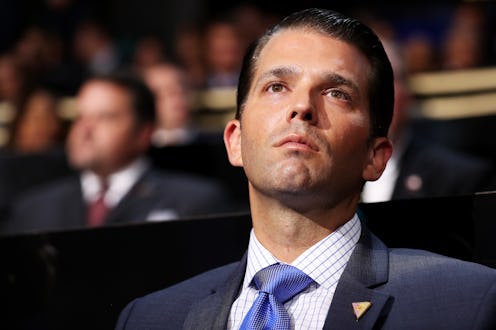News
Trump Jr. Released His Emails On Twitter Only When It Was Too Late

The Trump administration's Russia troubles have been considerably heightened following several damaging reports about Donald Trump Jr.'s meeting with a Kremlin-connected lawyer in 2016. On Tuesday, in what journalists have called a preemptive move, Trump Jr. released email correspondences about the meeting reportedly after the New York Times notified him that they were about to publish a story about them. This puts the first son's statement — in which he claimed to be releasing the emails "in order to be totally transparent," implying the decision was prompted by the intention to be clear up matters for the American public — in a different light.
"Confirmed from an NYT source," Brian Stelter, host of CNN's Reliable Sources, tweeted. "'We were preparing to publish' story — Don Jr. camp 'asked for more time' to comment 'and then pre-empted us'."
"When he was told NYT was about to publish the content of the emails, Donald Trump Jr. tweeted images of them himself," read a tweet sent out by the official Times account.
The Times report came on the heels of an interview on NBC News Tuesday morning with Natalia Veselnitskaya, the Russian lawyer Trump Jr. met. Veselnitskaya claimed that she never had information on the Democratic presidential nominee, and that the Trump team's "longing" for damaging material led them to making assumptions.
Later that day, the president's oldest son released the emails setting up his meeting with Veselnitskaya, which show that he was explicitly informed that the meeting was "part of Russia and its government’s support for Mr. Trump."
The emails spell trouble for the Trumps for at least two notable reasons. First, Rob Goldstone's emails appear to confirm that the Russian government was indeed aiding the president during the campaign — "This is obviously very high level and sensitive information but is part of Russia and its government's support for Mr. Trump," he wrote. Second, they include a message in which the first son appears gleeful at the thought of getting his hands on damaging Clinton information.
In a statement, Trump Jr. said his attempt to obtain negative information on his father's opponent was "political opposition research." While he may be able to legally make that argument, it will be much more difficult to dismiss accusations of collusion between his father's campaign and the Russian government after receiving a message explicitly informing him of the Russian government's efforts to help President Trump when he was a candidate.